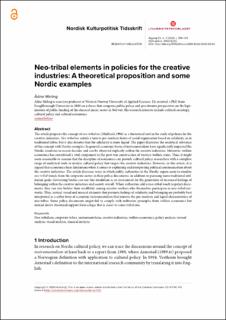| dc.contributor.author | Meling, Ådne | |
| dc.coverage.spatial | Nordic countries | en_US |
| dc.date.accessioned | 2021-01-14T08:19:36Z | |
| dc.date.available | 2021-01-14T08:19:36Z | |
| dc.date.created | 2020-12-11T18:45:27Z | |
| dc.date.issued | 2020 | |
| dc.identifier.citation | Meling, Å. (2020). Neo-tribal elements in policies for the creative industries: A theoretical proposition and some Nordic examples. Nordisk kulturpolitisk tidsskrift, 23(2), 104–124 | en_US |
| dc.identifier.issn | 1403-3216 | |
| dc.identifier.uri | https://hdl.handle.net/11250/2722907 | |
| dc.description.abstract | The article proposes the concept of neo-tribalism (Maffesoli 1996) as a theoretical tool in the study of policies for the creative industries. Neo-tribalism entails a turn to pre-modern forms of social organisation based on solidarity, as in traditional tribes, but it also denotes that the solidarity is more liquid. The paper illustrates the analytical relevance of this concept with Nordic examples. In general, economic forms of instrumentalism have significantly impacted the Nordic countries in recent decades and can be observed explicitly within the creative industries. Moreover, welfare economics has constituted a vital component in the post-war construction of western welfare states. Thus, it might seem reasonable to assume that the discipline of economics can provide cultural policy researchers with a complete range of analytical tools to analyse cultural policy that targets the creative industries. However, in this article, it is argued that economics faces limitations when it comes to explaining and interpreting political communication about the creative industries. The article discusses ways in which public authorities in the Nordic region seem to emulate neo-tribal trends from the corporate sector in their policy documents, in addition to pursuing more traditional utilitarian goals. Governing bodies can use this emulation as an instrument for the generation of increased feelings of belonging within the creative industries and society overall. When authorities add a neo-tribal touch to policy documents, they can also bolster their credibility among creative workers who themselves participate in neo-tribal networks. Thus, textual, visual and musical elements that promote feelings of solidarity and belonging are probably best interpreted as a softer form of economic instrumentalism that mirrors the pre-modern and liquid characteristics of neo-tribes. Some policy documents might fail to comply with utilitarian principles from welfare economics but instead derive rhetorical support from a logic that is closer to a neo-tribal one. | en_US |
| dc.language.iso | eng | en_US |
| dc.publisher | Universitetsforlaget | en_US |
| dc.rights | Navngivelse-Ikkekommersiell 4.0 Internasjonal | * |
| dc.rights.uri | http://creativecommons.org/licenses/by-nc/4.0/deed.no | * |
| dc.subject | neo-tribalism | en_US |
| dc.subject | corporate tribes | en_US |
| dc.subject | instrumentalism | en_US |
| dc.subject | creative industries | en_US |
| dc.subject | welfare economics | en_US |
| dc.subject | policy analysis | en_US |
| dc.subject | textual analysis | en_US |
| dc.subject | visual analysis | en_US |
| dc.subject | musical analysis | en_US |
| dc.title | Neo-tribal elements in policies for the creative industries: A theoretical proposition and some Nordic examples | en_US |
| dc.type | Peer reviewed | en_US |
| dc.type | Journal article | en_US |
| dc.description.version | publishedVersion | en_US |
| dc.rights.holder | © 2020 Author(s) | en_US |
| dc.subject.nsi | VDP::Samfunnsvitenskap: 200::Sosiologi: 220 | en_US |
| dc.source.pagenumber | 104-124 | en_US |
| dc.source.volume | 23 | en_US |
| dc.source.journal | Nordisk kulturpolitisk tidsskrift | en_US |
| dc.source.issue | 2 | en_US |
| dc.identifier.doi | 10.18261/issn.2000-8325/2020-02-03 | |
| dc.identifier.cristin | 1858954 | |
| cristin.ispublished | true | |
| cristin.fulltext | original | |
| cristin.qualitycode | 1 | |

